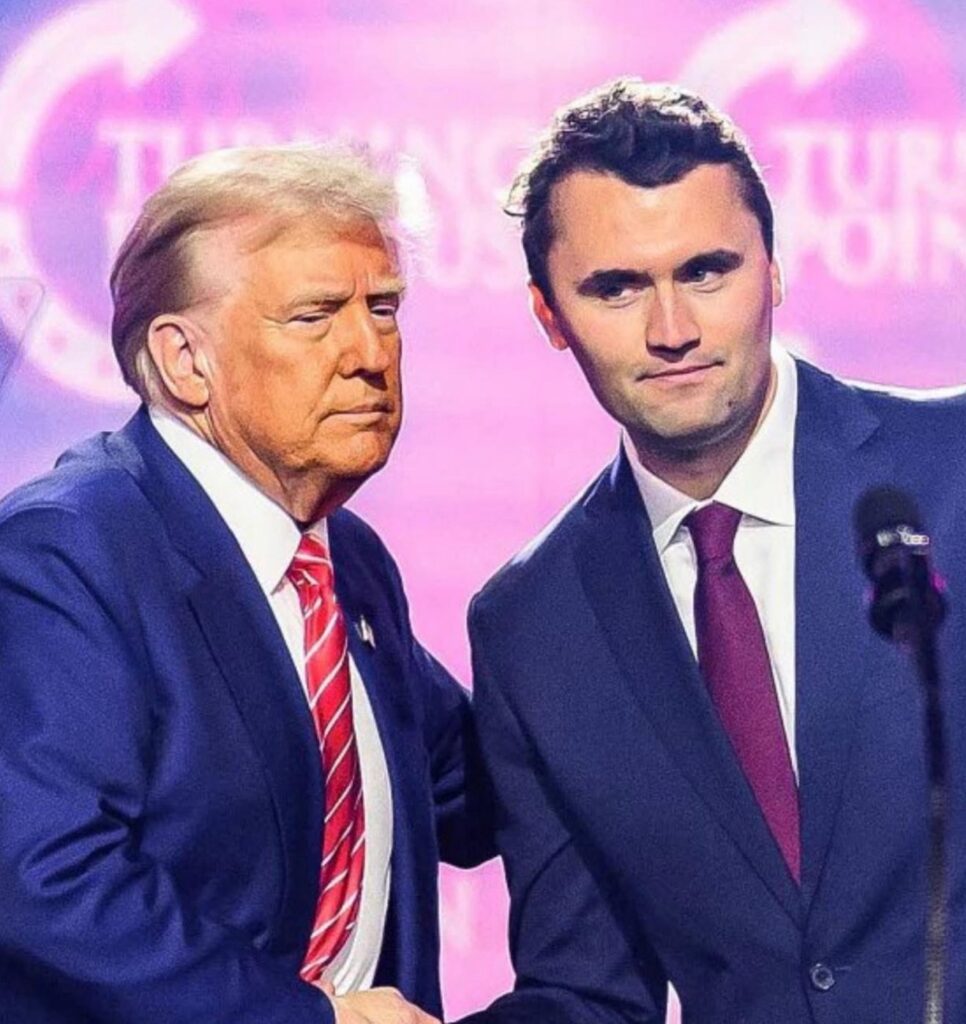Charles J. Kirk, widely known as Charlie Kirk, was born on October 14, 1993, in Arlington Heights, Illinois, United States. He grew up in Prospect Heights, a suburb of Chicago, in a middle-class family. His father, Robert Kirk, was an architect, while his mother worked as a mental health counselor.
Kirk’s upbringing in a suburban environment played an influential role in shaping his views about family, faith, and patriotism. He attended Wheeling High School, where he became involved in conservative politics at an early age. He briefly enrolled at Baylor University in Texas, but instead of pursuing a traditional college degree, he chose to dedicate himself fully to activism and political commentary.
From his teenage years, Kirk demonstrated an unusual interest in political philosophy, economics, and the dynamics of American society. This early passion would later define his career trajectory.
Personal Life of Charlie Kirk
Charlie Kirk is a devout Christian, frequently citing his faith as the foundation of his worldview and political philosophy. He has often spoken about the role of religion in his life and its importance in American society.
In May 2021, he married Erika Frantzve, a podcaster, businesswoman, and former Miss Arizona. Erika shares Kirk’s Christian values and is active in conservative and faith-based initiatives. The couple resided in Arizona, where TPUSA is headquartered.

Erika Frantzve or Erika Lane Frantzve is a former pageant winner and public figure in conservative circles. The couple had two young children, a daughter born in 2022 and a son born in 2024. Public reporting indicates that Kirk identified as an evangelical Christian and in the later years of his life emphasized faith in his public work, including church-oriented outreach tied to TPUSA.
Outside of politics, Kirk has expressed interest in reading, history, and mentoring young conservatives. He is known for his discipline and focus, attributes he attributes to his family upbringing and faith-driven lifestyle.
Founding of Turning Point USA
In 2012, at the age of just 18, Charlie Kirk co-founded Turning Point USA (TPUSA) with entrepreneur Bill Montgomery. The organization’s mission is to promote conservative values, limited government, free markets, and individual liberty, particularly among young Americans. TPUSA quickly grew into one of the most influential student organizations in the United States, establishing chapters on high school and college campuses nationwide.
Under Kirk’s leadership, TPUSA became known for its student summits, speaker tours, and online activism, positioning itself as a counterweight to progressive influence in academia. Its events have hosted high-profile conservative figures, including former President Donald Trump, Tucker Carlson, and Candace Owens.
Kirk cultivated a multiplatform media presence — podcasts, radio, streaming shows, social video, and frequent cable and conservative media appearances. Kirk leveraged social media and digital platforms to reach wider audiences. His sharp debating style and provocative commentary gained him a substantial following. He became a regular contributor on Fox News and other conservative media outlets, where he addressed issues such as immigration, economic policy, cultural debates, and education reform.
In 2019, he launched The Charlie Kirk Show, a popular podcast and radio program that covers politics, news, and cultural issues from a conservative perspective. The show has consistently ranked among top political podcasts in the United States.
Political Engagements
Charlie Kirk has played a visible role in conservative political movements. He was a vocal supporter of Donald Trump during the 2016 and 2020 presidential campaigns. In 2019, he was named chairman of Students for Trump, an initiative aimed at mobilizing college students in support of Trump’s reelection campaign.

Though never elected to public office, Kirk has wielded significant influence in shaping youth engagement with conservative politics, often bridging the gap between grassroots activism and mainstream political leadership.
Books and Publications by Charlie Kirk
Charlie Kirk has authored several books that reflect his political and cultural perspectives, including:
- “Time for a Turning Point” (2016) – outlining his vision for American conservatism.
- “The MAGA Doctrine” (2020) – analyzing Donald Trump’s political philosophy and its influence on the Republican Party.
- “The College Scam” (2022) – a critique of the U.S. higher education system, where he argues that many colleges have become indoctrination centers rather than educational institutions.
Controversies and Criticism
Kirk has been a polarizing figure in American politics. Supporters praise his unapologetic defense of conservative values, his ability to connect with young audiences, and his boldness in challenging progressive narratives. Critics, however, accuse him of promoting divisive rhetoric, oversimplifying complex issues, and aligning too closely with far-right politics.
Despite criticism, Kirk has remained steadfast in his mission, often embracing controversy as a way to energize his base and bring attention to his causes.
Legacy and Influence
Charlie Kirk’s legacy is contested and complex. Supporters emphasize his remarkable capacity to build a youth movement, professionalize conservative campus organizing, and energize a generation of activists who embraced an unapologetic, culture-war style of politics. Detractors highlight a record of incendiary rhetoric, documented misinformation, and contested nonprofit practices that, in their view, undermined democratic norms and amplified polarization. Scholars and journalists assessing Kirk’s long-term influence note that regardless of one’s political stance, his career demonstrated how targeted media strategies, donor networks, and institutional design can create outsized political influence in a relatively short period.
At a relatively young age, Charlie Kirk has cemented his status as one of the most influential conservative activists of his generation. Through Turning Point USA, media presence, and public speaking, he has shaped debates on free speech, education, and American identity.
His work continues to influence both grassroots movements and mainstream politics, ensuring that he remains a central figure in the evolving landscape of American conservatism.
Death: Shooting at Utah Event
On September 10, 2025, Charlie Kirk was shot while speaking at an event in Utah organized by Turning Point USA. Multiple major news organizations reported that he died of a gunshot wound; law-enforcement sources and press reports indicated that a suspect was taken into custody following a manhunt and that authorities were pursuing charges. The shooting provoked an immediate and intense national reaction across conservative and liberal media: public figures issued statements, campus security and event-safety discussions intensified, and Kirk’s supporters organized memorials and fundraising drives for his family.
In the days following, outlets reported large public expressions of mourning and political solidarity among conservative leaders; some high-profile figures participated in memorial services or publicly honored Kirk’s role in conservative organizing. At the same time, commentators from across the political spectrum debated the rhetoric and polarization that preceded the incident, with some noting Kirk’s own prior warnings about political violence and others condemning violence without assigning a singular causal explanation. Investigations into motive and circumstances were ongoing at the time of the earliest public reports.
Charlie Kirk’s trajectory from a teenage campus organizer to a nationally recognized conservative leader illustrates the changing architecture of political influence in the digital age: nimble organizations, viral content, and concentrated donor support can propel a young activist to centrality in a major political movement. His death in 2025 marked a sudden and tragic end to a career that had already reshaped the conservative youth landscape; it also sparked renewed debate about political rhetoric, event security, nonprofit governance, and the responsibilities of public figures in an era of heightened polarization.
Follow Wakopedia for more interesting reads!